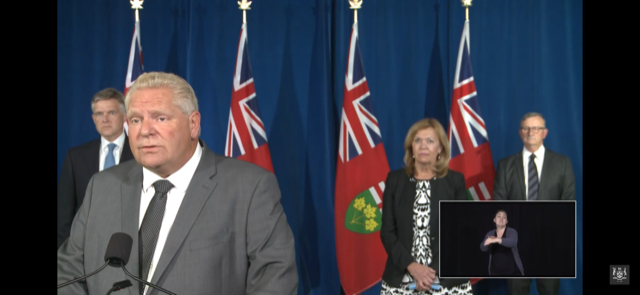It was a subdued Premier Doug Ford at his daily media briefing on Monday as new COVID-19 cases set records in Ontario.
Ford called today’s 700 new cases deeply concerning, “Health officials are telling us that Ontario is now in the second wave of COVID-19. We know that this wave will be more complicated, more complex it will be worse than the first wave we faced earlier this year. We’ve all played a critical role to play. Please follow the health guidance, please download the COVID alert app, and please get your flu shot this year. It is absolutely critical. If we can get everyone to take these simple steps, we can tip the scale, we can avoid the worse because we know we are in the second wave. We know that it will be worse than the first wave, but what we don’t know yet is how bad the second wave will be. The reality is it is up to each us, together our collective actions will decide if we face a wave or a tsunami.”
Ontario’s Chief Public Health Officer Dr. David Williams said the province is studying several metrics to determine how big the second wave will be. Those metrics include hospitalizations, outbreak cases, cases, lab testing capacity, and contact tracing and management. Williams said he doesn’t think this will be a tsunami-like second wave, “It looks like an undulating wave, how big it is we don’t know yet. It’s not the tsunami-like second wave.”
Williams says Ontario is better prepared than it was in the first wave but people need to hunker down and flatten this curve, “I think we can do that again if we focus at our task at hand.”
Deputy Premier and Health Minister Christine Elliott said the government does not want to roll back into Stage 2 if they don’t have too, “But if we do have to, we will, because the most important thing is the health and well-being of the people of Ontario.” That comment comes on the heels of the Ontario Hospital Association calling on the government to roll back hotspots like Toronto and Ottawa as cases continue to spike in those regions.
Ford announced the province will be spending $52.5-million to hire, retain, and train over 3,700 more frontline healthcare workers in order to make sure the healthcare system can meet any surge in demands. This is another pillar in the province’s COVID-19 Fall Preparedness Plan. The province will also invest $26.3-million to support personal support workers (PSWs) with another $26-million to support nurses across the province.





